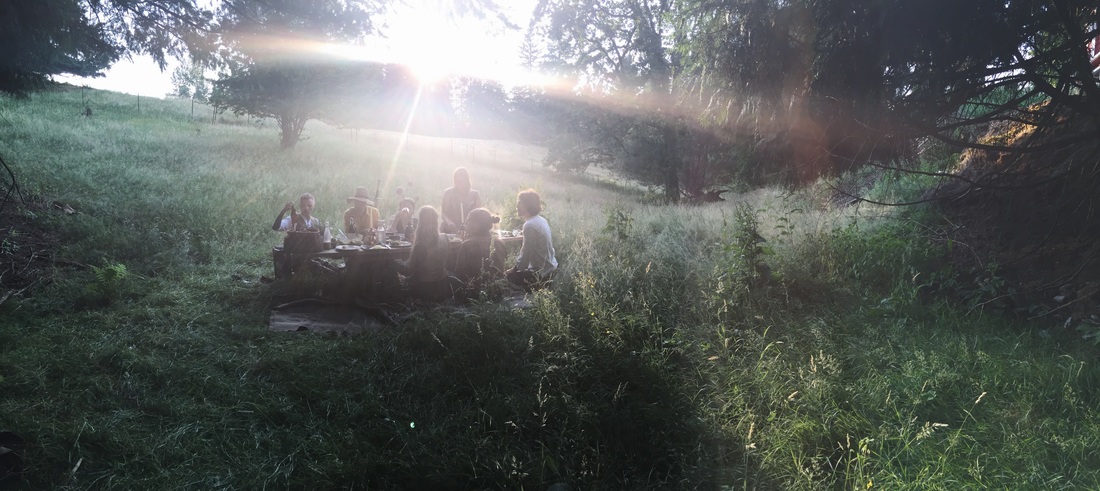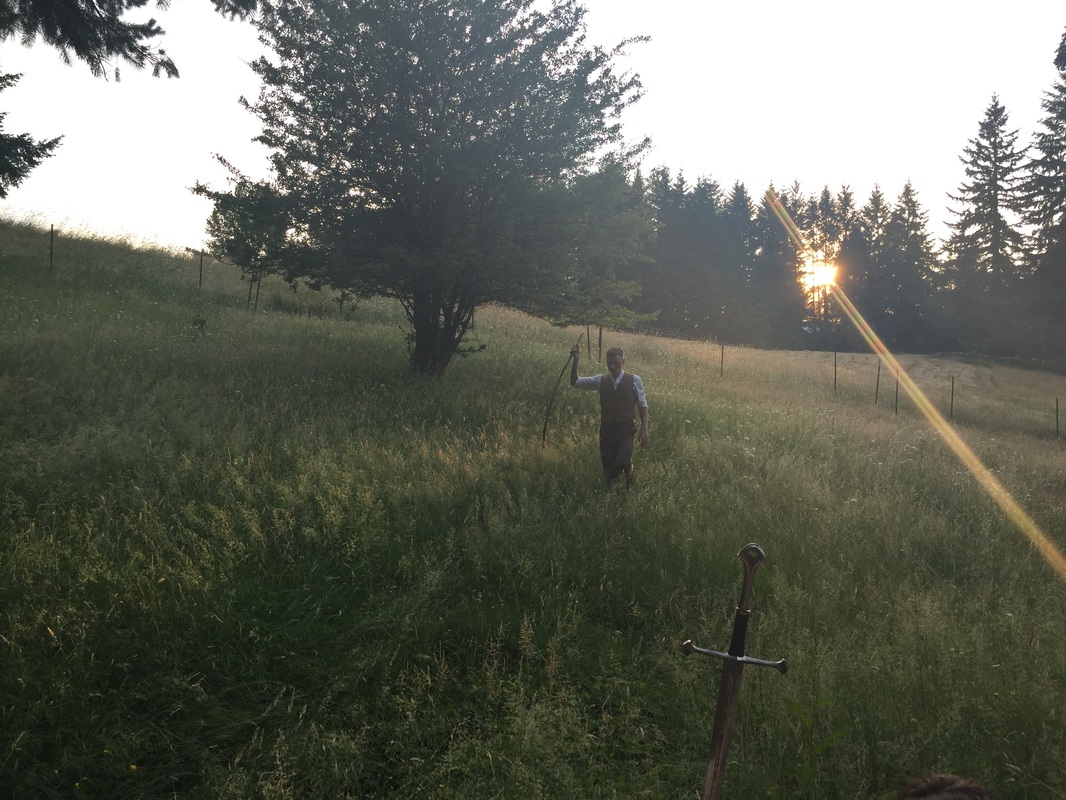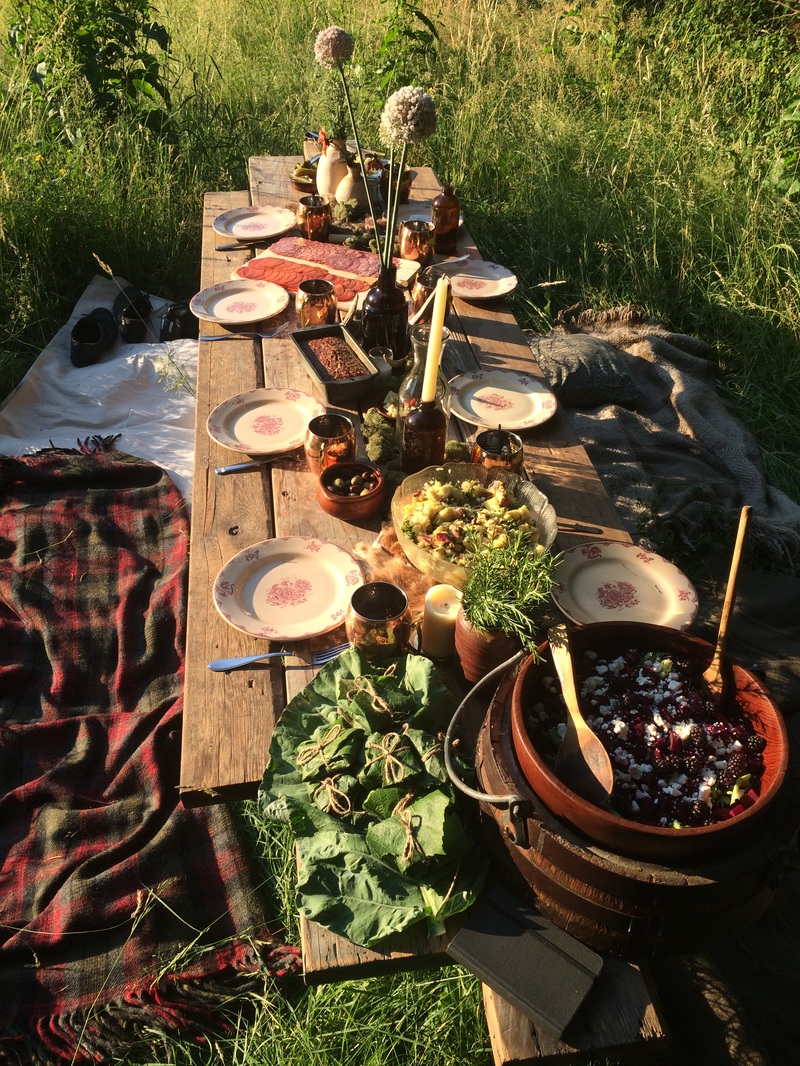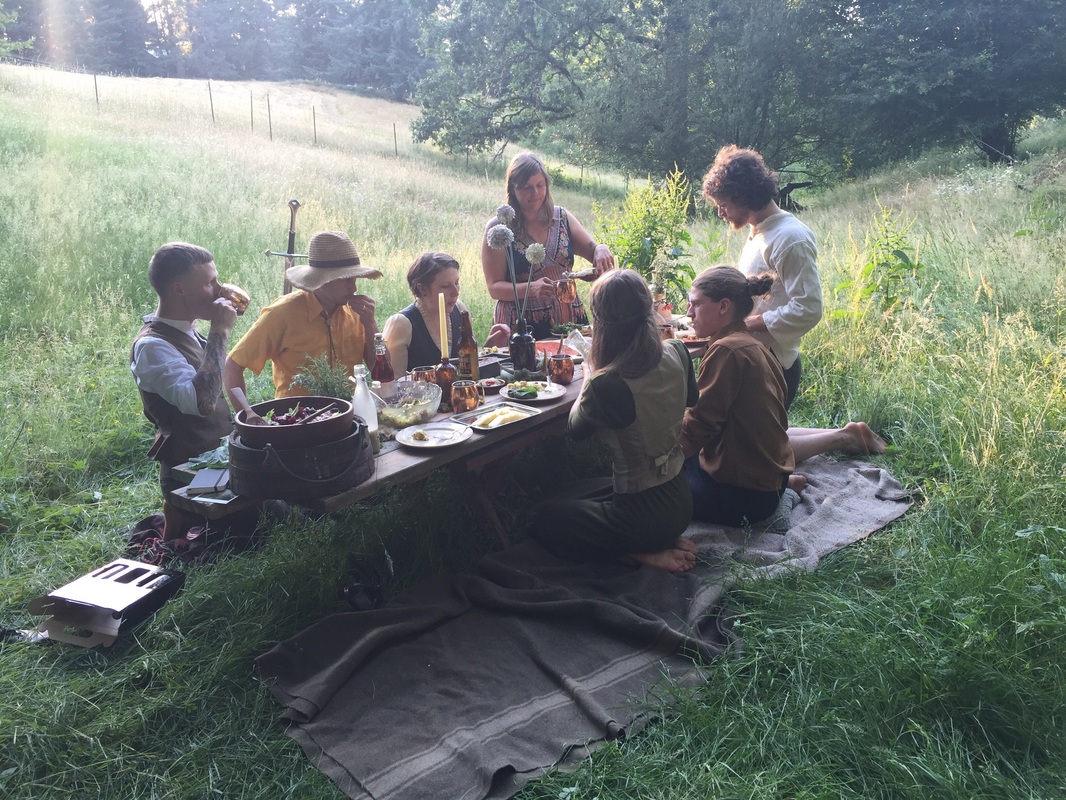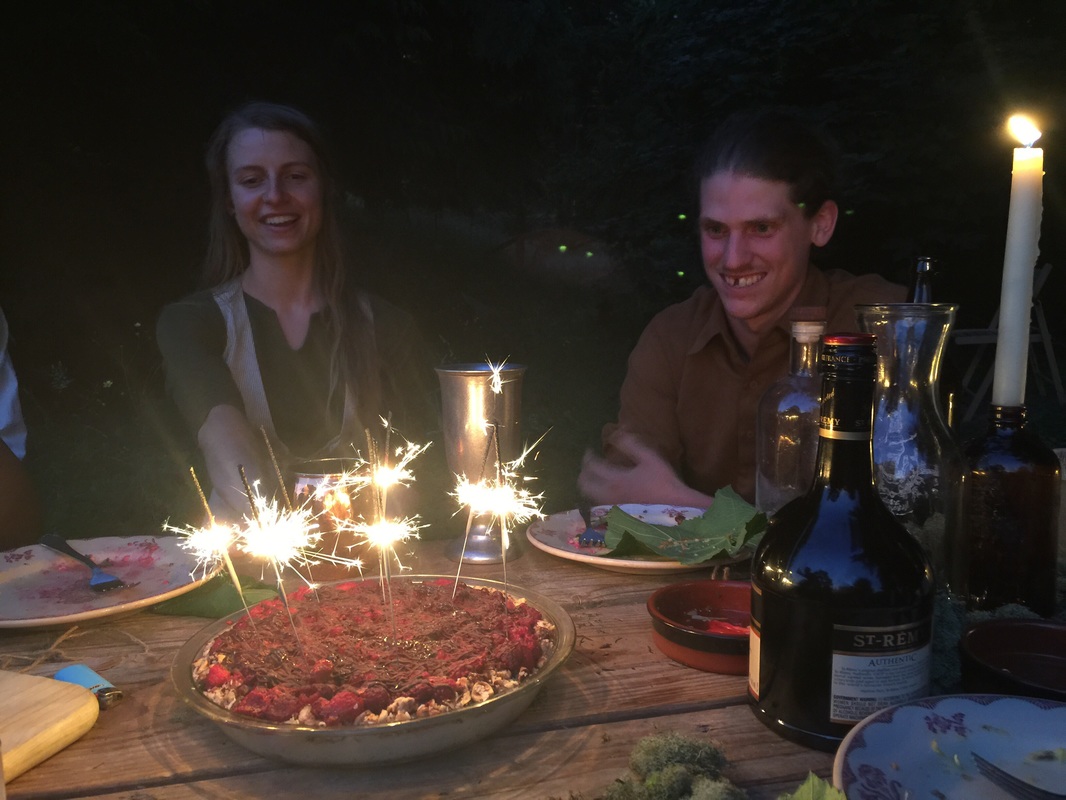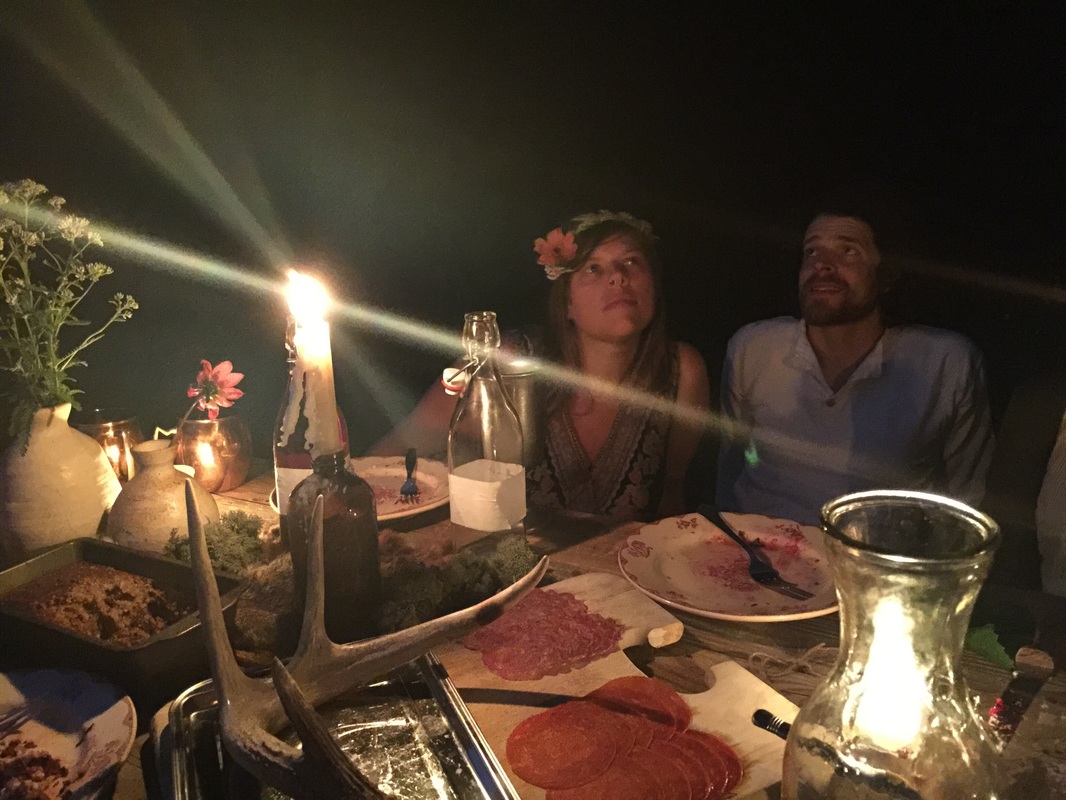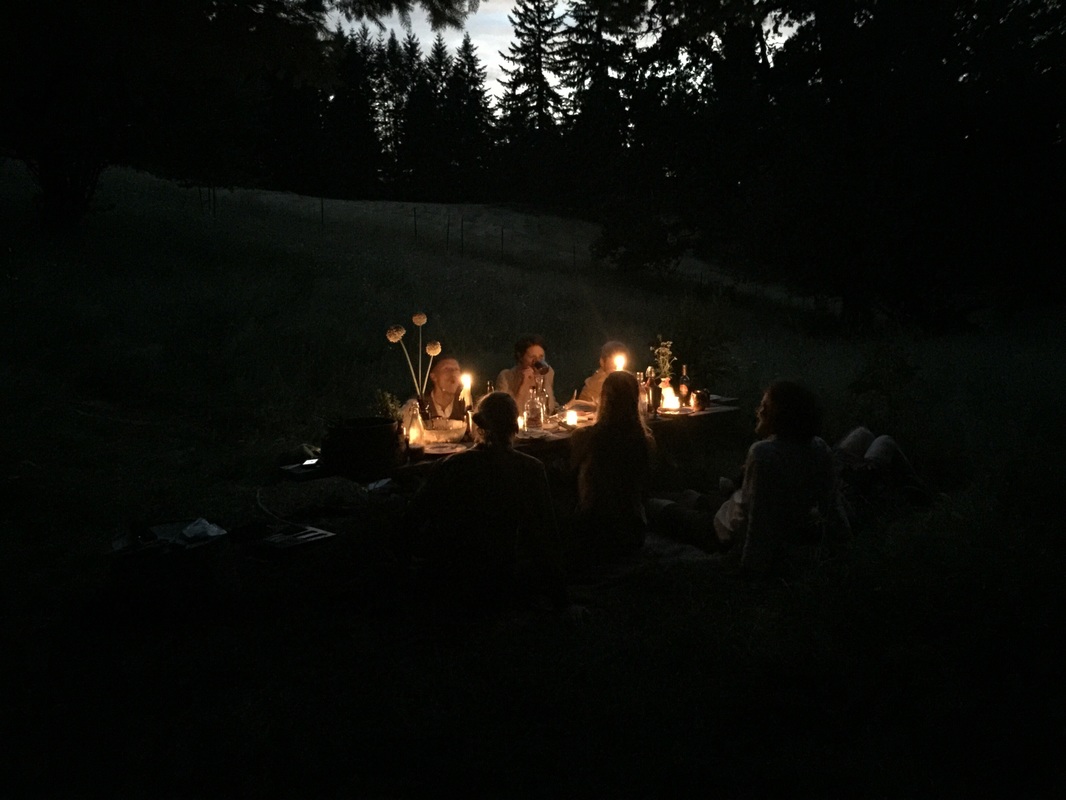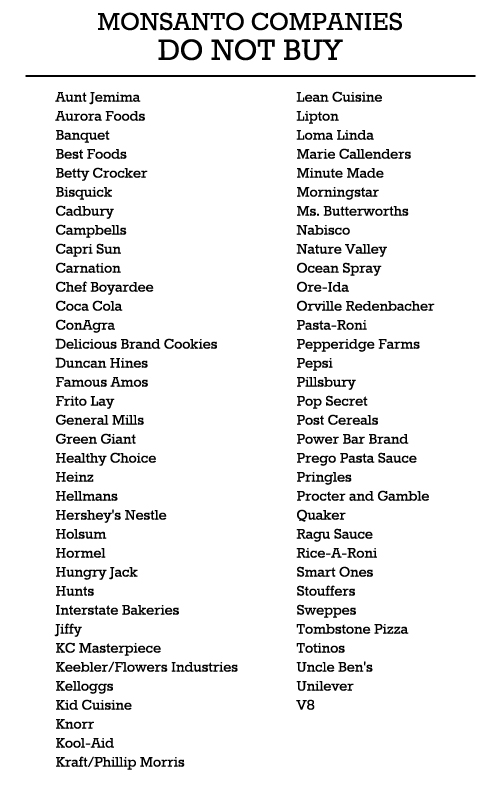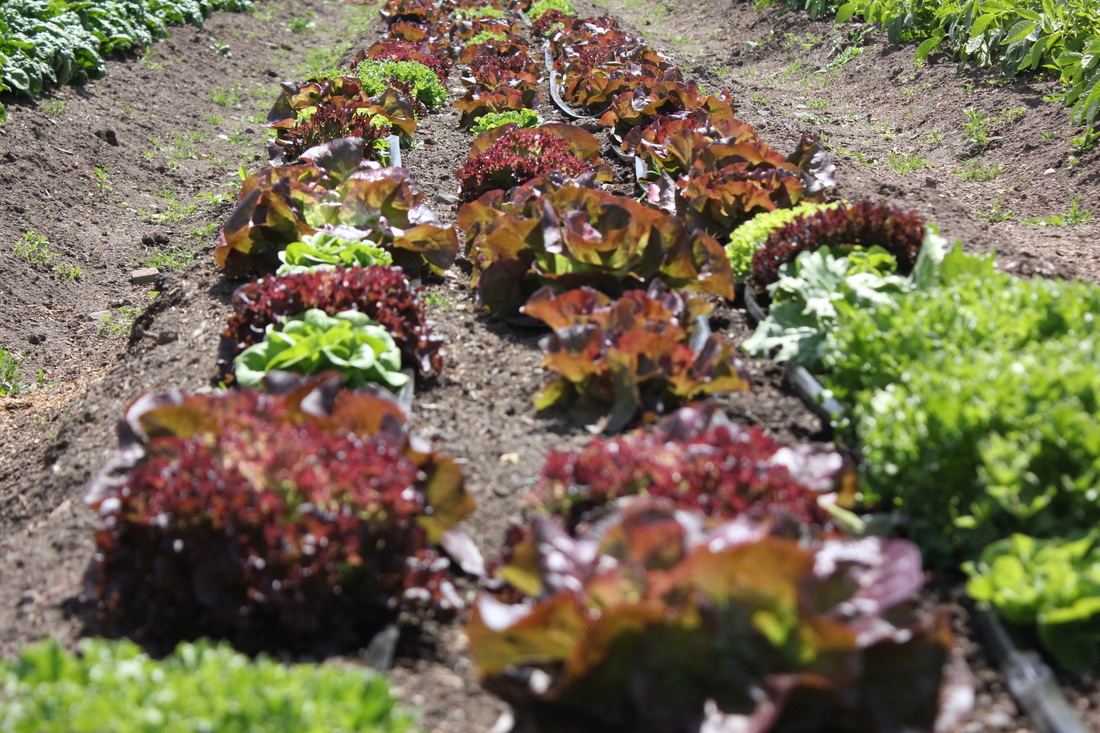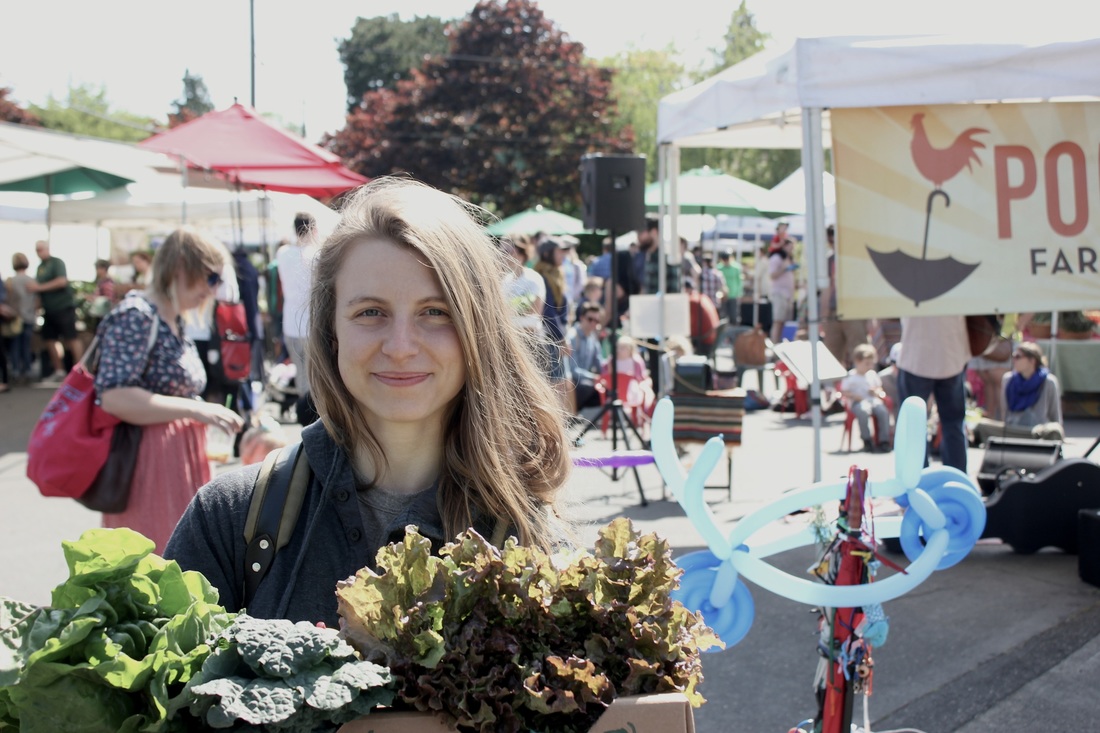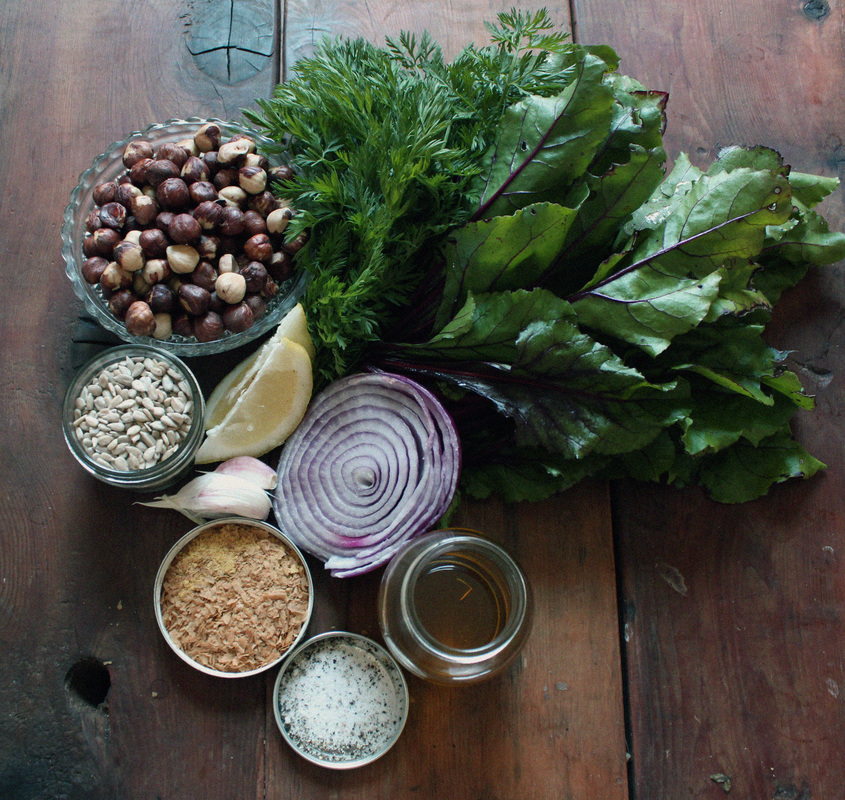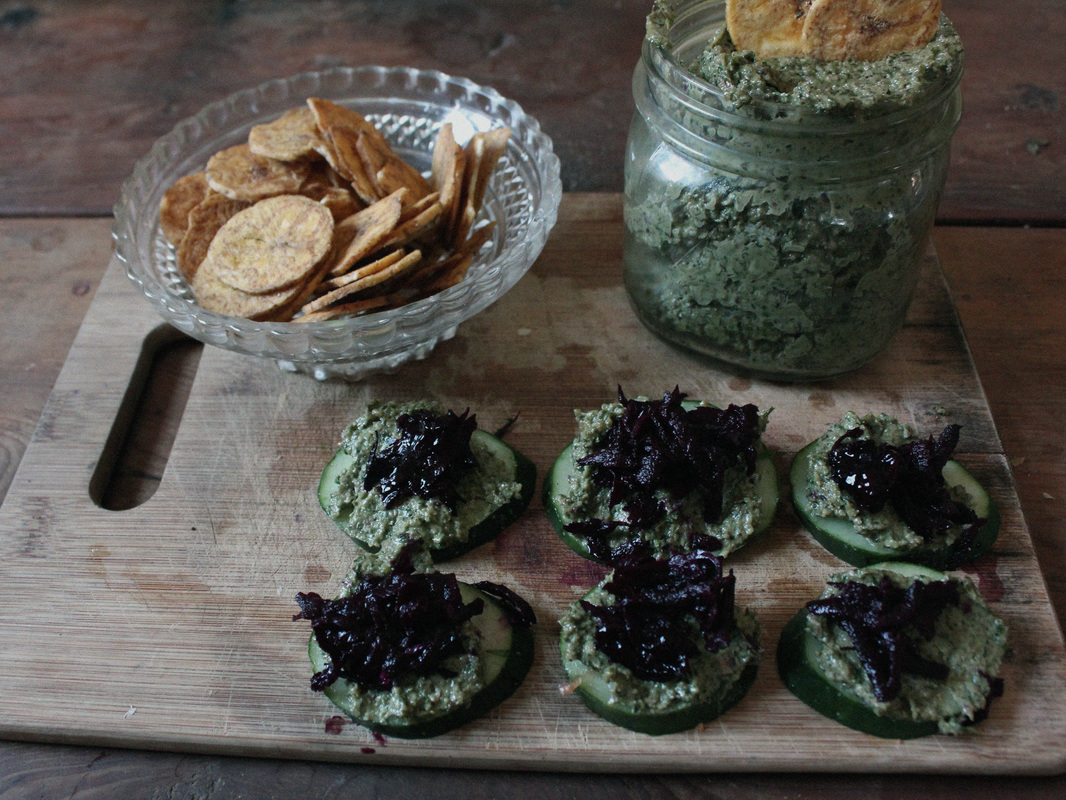|
There is something so magical, true and hopeful about Tolkien's Lord of the Rings. It parallels very closely with the life Johnny and I feel we are living. All hope rests on a small hobbit to carry the ring to be destroyed, we all choose whether we want to be hobbits, men, elves, dwarfs, fighting together for a world of peace, or we can be orcs, greedy and violent, without care for the state of the world. I see large corporations as orcs, destroying our world and making it uninhabitable. We choose whether we fight on their side or on the side that may seem less hopeful, for we are small, like hobbits. The difference between us and them: we don't have to give into greed and the need for power. In Lord of the Rings, when Saruman finds out that a hobbit has the ring, he immediately assumes that he is keeping it for himself to rise to power, it never occurs to him that Frodo would be taking it to be destroyed, and that is his downfall. He could never imagine someone not taking that power for themselves. In our culture, the ring parallels with money, power and fame. We sell our souls for these things and we've destroyed our home in the process. It's a similar story with Jesus in the Bible. The Jews thought he was coming to be their King, taking power from their oppressors, it never crossed their mind that he would come to die at the hands of those in power, showing them that the way is one of sacrifice. Somehow this story isn't retold in a way that causes us to really lose our lives in order to find them. We still stay in our safe places. Jesus came into the violence of the world just as Frodo left the Shire to on a treacherous journey to Mordor. There is a time to celebrate and enjoy life and there is a time to fight for what is good and true. Despite all the thoughts that swirl in my head everyday, I do make time to relax and enjoy good food and friends. The large shadow cast on my life doesn't engulf me; there is light. This weekend I surprised Johnny with a Shire themed Half-Birthday celebration. I felt like he and I needed it. Our amazing friends rose to the occasion and came to celebrate with us. It was a time to escape and pretend we were in the safety of The Shire, where we can be simple and filled with joy. Sharing good food with friends is one of my favorite things. I made a refined sugar free, grain free, dairy free dessert! (pictured above) It was a layers of Cashew Cream, Ground Hazelnuts, Coconut Shavings, Chocolate and Fresh Raspberries. I added the sparklers as my tribute to Gandalfs fireworks. Steven and I serenaded the group with The Shire theme song. No matter the hopelessness you feel in life, remember to never stop fighting for what is true and good in the world and take time to be thankful and enjoy life. We may be mere Hobbits, but we too can create change.
0 Comments
"PEOPLE ARE FED BY THE FOOD INDUSTRY, WHICH PAYS NO ATTENTION TO HEALTH, AND ARE TREATED BY THE HEALTH INDUSTRY, WHICH PAYS NO ATTENTION TO FOOD." -Wendell Berry I started out this experiment {Eating Well on a Budget} in a state of optimism; I was flying high. It's been my dream ever since I started pursuing nutrition to make good food and health accessible to all. What I discovered through this experiment, and what I already knew, is that the food system is not set up for low income to afford nutrient dense food. The government subsidizes certain crops so that they are unrealistically cheap. Here are the top ones:
According to a study done for The Atlantic the government gives $77 million dollars to the corn industry every year. This makes things like corn seem cheap when in reality it's just expensive as all the "fancy" food only the rich can buy. This means junk food will always undercut nutritious food in price. ""Corn -- which is processed into the junk-food staple corn syrup ... exemplifies the scheme ... it is a bargain, but one created by deliberate government policy that serves the corn industry titans, not by any genetic advantage that makes corn derivatives automatically more affordable for the budget-strapped commoner." (source) The Government is subsidizing a Fast-Food, Illness-Causing Diet "Why would a farmer choose to plant lettuce or Swiss chard when the government will essentially "insure" their corn crops, paying them back if the market prices fall below a set floor price? Likewise with wheat and soybeans, the second and third most heavily subsidized crops, respectively. Most of them wouldn't … and that's why the U.S. diet is so heavily loaded with foods based on the surplus, nutritionally devoid crops of corn, wheat and soy. One of the effects of the farm bill is to create a negative feedback loop that perpetuates the highly profitable standard American diet. Unfortunately, the government is showing no signs of subsidizing vegetables the way they do corn, grain and pasteurized milk. This is most like a result of the Department of Agriculture's deep alignment with agri-business. Current legislations protect the profits of these large industries at the expense of public health. This may surprise you, but the agriculture lobby is more powerful than even the pharmaceutical industry! As if this isn't all frustrating enough, most of the subsidies are going to mega-farms that are making more money than most Americans even dream of …" "These junk-food subsidies make it much cheaper to buy a burger, fries and soda from a fast-food restaurant than it is to buy grass-fed beef and veggies. It's not that these foods necessarily cost more to grow or produce but is that the prices for the junk foods are being artificially reduced by the government." And guess what? They use OUR tax dollars to do this. All these companies below use Monsanto, GMO and Government Subsidized Food in their products: The slow degradation begins: you eat subsidized food cause it's cheaper, but it ends up causing you health problems in the long run, and then you have to turn to the medical industry, which treats you with pharmaceuticals, so in the end you are spending money on medical bills when you could've just spent that money on good food in the first place. Now, I know not every one can afford good food upfront, and that's where the problem lies. This is why I wanted to do this project. You can see how messed up this all is. Not to mention that these crops, grown this way, are destroying our soil. I did a journal post on soil health you can check out here. Destroying our soil means we are destroying ourselves, we are nothing without nutrient rich soil. But these big businesses don't care about soil health, they don't care about your health, they care about profit and doing things quick, big and efficiently. Are you depressed yet? There's more. Lets talk about overpopulation and degradation of our soils: "According to the World Bank the main source of pressures generating problems of degradation is thought to lie in rapid population growth. Other pressures come from the widespread use of natural resource intensive technologies; ineffective regulation of common property resources; land tenure systems that do not secure long terms rights to land use; and policies that distort the prices of non-renewable resources" [World Bank 1991, in Biot et al. (1995)]. The equation goes: Overpopulation + Higher demand to grow food on a large scale and quickly + Using poor farming methods that destroy soil = Destroyed soil, which lacks nutrients and soon will become un-usable = The lack of nutrients causes nutritional deficiencies not to mention the chemical poisoning from pesticides/chemicals = We are getting sicker and sicker and Healthy land is less and less available as population continues to grow = We don't have the capacity to support the world's population with these farming techniques = Wars over food in the future and the possible extinction of humans if we continue this way. Officially depressed? Welcome to my world. I think about these things everyday and try not to get bogged down. I don't know if the small changes I pursue can help at this time in history, but that doesn't mean I give up, just more people need to join in. We can't feed the world and stop poverty without different methods being implemented. This is where small scale regenerative farming in your region comes in. But that could be a whole other journal post. So! Back to my project recap: The goal of my project was to eat well on a budget. Eating well meant: -Grass Fed Meats -Pastured Eggs -Organic and/or Local Produce -Minimal Grains/Sugar Because I still am healing from my allergies I was randomly struck with 2 years ago, I had to change up the project half way through to meet my needs. I started out eating a lot more grains and some dairy until I realized that my body wasn't ready for this. So the second half I consumed lots of bone broth, zero grains and dairy besides rice and pastured butter and zero sugar besides some fruit. The project went for a month and needed to be under $400 for two people. Here are some of the things I found helpful to the overall budget: Buying in Bulk And not just grains/beans but also meat and eggs. The biggest issue I found with this, though, was the ability to buy large amounts upfront as well as having the freezer space (for the meat). A buying club where people go in on meat together from a farm is the best option I can think of for this issue. I bought 12 cartons of pastured eggs @$5 from a farm for the month, and because you don't need to refrigerate fresh eggs you can store them in a cool spot and they are fine for over a month. Another issue with this is the inability to use food stamps. Rice and beans are obviously exempt from this. Bulk Cooking This one helps the most with those of you who are short on time during the week. I assume everyone has at least a couple hours a week to prepare food, with this method you're basically making large meals that you can freeze/refrigerate so that you don't have to cook all week long for every meal. Things like Soup, Curry and Casseroles. (crock pot meals so you can turn it on and forget about it!) Spend a few hours one day and cook up a storm! Fermenting/Soaking/Sprouting This is one of my favorites. Fermenting and soaking your veggies/grains is a great way to add nutrition and aid in digestion without any added cost. The main issue with this can be the difficulty in remembering what you have fermenting, when it's done and when to start another batch. I make sauerkraut all the time and when I'm getting low I start another batch so I never run out. I also soak and sprout my rice to make it more digestible as well as soak/sprout/ferment my beans. I really can't digest beans otherwise. Using "Waste" There are so many scraps of things we can use. Animal bones are one example. They are really cheap to buy and you can make mineral rich stock with them for soup. A few other things I add into my stock are Onion Skins: these are high in the bioflavanoid Quercitin which is known to inhibit histamine production in people with allergies. I also wash my used egg shells for stock; these are high in calcium. The other day I made pesto with the beet greens and carrot tops (usually the veggies at the farmers market have these attached) Consuming Healthy Fats Fat is a great energy source for the body, it burns a lot slower than carbohydrates so that you stay satiated longer. For people who are concerned with overeating or tend to binge, adding in some healthy fats can really help. They also curb sugar cravings. These include things like grass-fed meats, wild caught fish, pastured butter, coconut oil, avocado, nuts and seeds, olive oil based dressings etc. Overeating costs more and is negative for your health overall. Eating Less Sugar When talking about budgeting I like to also think about the future. When we eat poorly we are actually going to end up spending money later on medical bills. So we either spend the money now or later. (Again, I do understand that some people just don't have the money upfront.) Eating less sugar will help in all of this...why? Because when you consume sugar it actually takes minerals from you. You are eating an anti-nutritent, which sucks health from your body and causes a host of deficiencies. Save money by saving your health and not eating refined sugar! A few other things I think are important to mention: You have to have time, or you have to have money. Eating well doesn't happen naturally, as I mentioned above, our food industry is set up so that all the convenient/unhealthy food is subsidized by our government. If we have time we can prepare healthy meals with cheap ingredients; such as fermented beans and sprouted rice, we can drive out to farms and get fresh meat, eggs or milk, we can cook at home and have stuff ready for when we're on the go. If we have money we can buy humanely raised, grass-fed meat and animal products, as well as other well produced food, we can hire someone else to cook for us (insane, I know), we can buy prepared foods that are also healthy but expensive. I wish I could say differently but this is the truth, health has to be a priority, we have to give up other things in order to eat well. I encourage everyone to look at their budget and see if there is anything un-neccessary on a month to month basis that they could cut out. Put your health in YOUR hands. So, you may be wondering, did I manage to meet my goal of spending $400 for two people this month?
Well, technically, I did. That is, we only ate $400 worth of food. We bought more than that because we purchased meat in bulk. But this can be remedied with a buyers club or going in on meat/eggs/milk/rice/beans with friends. Thank you all for following my little journey. I will continue working on resources as well as working towards buying land so that Johnny and I can do this work ourselves! It is our dream to own property and raise animals humanely, grow nutrient dense food, teach nutrition and care for the soil. -Bailey Another genius way to eat well on a budget is using the tops of farmers market produce such as beet greens or carrot tops; which is what I've done here. I call this a Pesto but in reality it has little in common ingredient-wise. Regular Pesto has Basil, Pine Nuts and Cheese. This has Beet Greens, Carrot Tops, Hazelnuts, Sunflower Seeds and Nutritional Yeast (as a cheese flavor replacement). What it does have in common is Garlic, Lemon Juice and Olive Oil. Recipe: 2 handfuls of chopped Beet Greens 2 Handfuls of chopped Carrot Tops 1 cup Soaked and Roasted Hazelnuts 1/2 cup Sunflower Seeds 1/4 of a large Onion 2 large Garlic Cloves 3/4 cup of Olive Oil 1/2 Lemon (juice) 2 Tbsp Nutritional Yeast 2 tsp Sea Salt Pepper to taste The benefits of this recipe are many. As I mentioned, using the greens on produce that are usually thrown away saves money, obtaining good fats in the form of nuts and olive oil and the immune stimulus from onion and garlic. Soak your hazelnuts for at least 5 hours and then roast them till crunchy in the oven. Chop up greens, onion and garlic. Combine everything in a food processor and process till desired consistency.
Then enjoy! I put mine on slices of cucumber with a little bit of fermented beets that I made. Johnny ate it with some plantain chips! |
Details
Bailey Patrice & Jonathan DavidCategories
All
Date
December 2017
|
